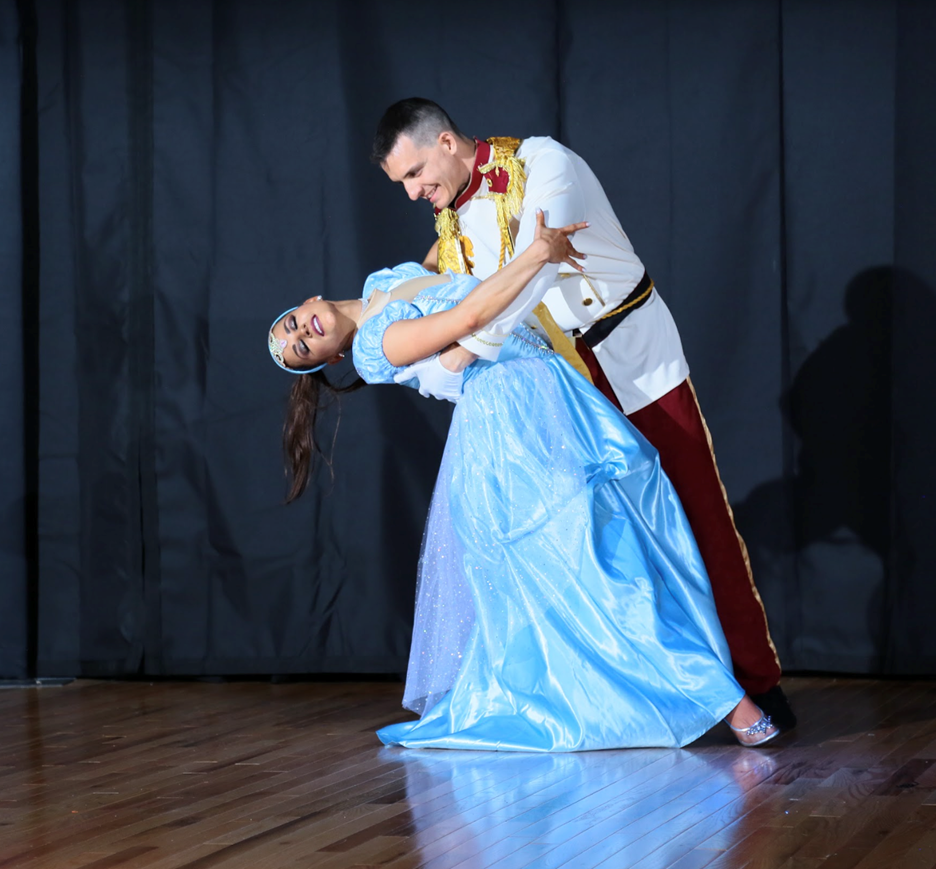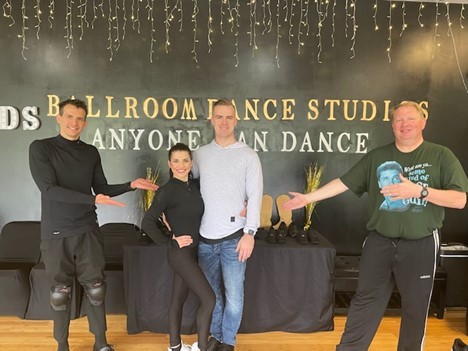Breaking Ground 110 - Dancing our way to health and confidence
By Dave Griffin, 2021 graduate of Partners in Policymaking® Leadership InstituteMy name is Dave Griffin. I am on the autistic spectrum. I wanted to write about my experiences with ballroom dancing along with two other men on the autistic spectrum: Benjamin Rubbelke and Orlanden Frazier. I also wanted to introduce you to Ballroom Dance Studios, where all three of us are students.
Ballroom Dance Studios has two locations in Hermitage, Tennessee and Bowling Green, Kentucky. The studios are owned by Brooke Mortimer and Devan McClish.
I interviewed Brooke about teaching dance to people on the autism spectrum.
Interview with Brooke Mortimer
What have you learned through teaching dance to students on the autism spectrum?
We truly live by our mission, "Anyone Can Dance." That includes anyone on the autism spectrum. We currently have several students with autism who have excelled in this activity. It just reinforces our mission and shows that anyone can learn how to ballroom dance!
What have you found most satisfying in your work with students on the spectrum?
We have found that it helps those students’ social skills and motor functions. Not only are they learning a new skill, but they are also learning how to interact with people better!
What advice do you have for people on the spectrum who are interested in learning ballroom dancing?
Anyone interested in learning ballroom dancing should know there is a community of people on the autism spectrum already within the Tennessee ballroom dance community. They are accepted and welcomed, especially in our studio!

Dance Student Perspectives
How Did You Get into Ballroom Dancing?
Benjamin Rubbelke: I was first introduced through swing dancing and danced swing for 2 years. Then I was introduced to Big Band Dancing in Centennial Park in 2019. Just before COVID hit, I went to check out one club that was open. I enjoyed it so much. COVID happened and the studio reopened and recommended me to Brooke and Devan. They have been my instructors ever since.
Orlanden Frazier: My mom introduced me to Brooke and Devan.
Dave Griffin: Interestingly, I decided to pursue social relationships with women about one year before I realized I was on the autistic spectrum. I tried dating services, but I felt too much pressure meeting a total stranger and trying to see if there was a romantic connection. I wanted to do something with ladies that we both enjoy that did not involve the pressures of dating. I tried ballroom dancing. Four showcases and two competitions later, the results in being more comfortable around women have been amazing. I value the emotional fulfillment I get from having so many meaningful connections with so many women. But I am just friends with all of them
How has dancing changed you?
Benjamin Rubbelke: Ballroom dancing has changed me both physically and mentally. I've improved staying active with moving my body and expressing myself with emotions that are much more physical than verbal. I've been told I'm very visual. This has helped me to watch movements. The movements they teach are so elegant that it provides a wonderful feeling that can stay with me the rest of the day.
Orlanden Frazier (Orlanden’s mom, Lee Ann Horton, helped with these questions)
Orlanden believes that dancing was a good thing for him to do. He also said, “The worst thing about the show experience was all the people watching me, and the noise.” The best thing about the show experience was “just the fun of dancing and showing my friends and family how hard I worked.”
Lee Ann feels ballroom dancing offers Orlanden a great opportunity to gain confidence both within himself and improve his gross motor skills in a fun way. Lee Ann said, “He also increased his social interaction skills in a safe and loving environment. Brooke is very talented in seeing individuals’ strengths and working with them to counterbalance weaknesses.”
Dave Griffin: Feeling socially insecure around people in general and women in particular is common among men on the autistic spectrum. This has certainly been my experience. I think I can safely say that trust and confidence have replaced my fear and anxiety about being around women. Ballroom dancing has played a major role in this transformation for me. In short, ballroom dancing helps me feel better about me.
In terms of working with the right dance instructor, a very special but platonic bond develops. It really helps to think of my instructor as a teammate. I have learned to work out whatever anxieties I have, which I found necessary to be successful as a dancing team. Brooke is someone to whom I can say whatever needs to be said and worked out so we can concentrate on our work.
How can others get involved with learning to dance?
Benjamin Rubbelke: Ballroom dancing is very intricate. You have to be patient, dedicated, and have a lot of passion. Once you progress down that road, it produces wonderful results. It gives you a way to dance long stressful weeks off. I would advise when you learn dance not to rely on what you see but you feel. If you are interested in ballroom dancing, I would highly recommend reaching out to Ballroom Dance Studios. They are affordable, professional, and most important, they will never, ever pressure you into spending money you don't want to spend or learning something you don't want to learn.
Dave Griffin: I would recommend Ballroom Dance Studios to anyone interested in ballroom dancing, whether they are on the spectrum on not. For more information on taking ballroom dance lessons, you can email Brooke Mortimer and Devan McNish at ballroomdancestudios@gmail.com or you can visit their website at https://www.ballroomdancestudios.org/booknow .
Or, as a self-advocate who has pledged to be available to any self-advocate, my direct cell number is 615-679-6997. You can call me, Dave Griffin, if you need help. I think anyone could benefit physically, emotionally, and spiritually from ballroom dancing. Give it a try!

Other social opportunities to explore
If you need some social outlets to help you prepare for ballroom dancing, or you just want to try something else, I am part of some programs designed for people on the autistic spectrum. I am the Teen and Adult Program Manager for Autism Tennessee.
- I facilitate a Game Day, which happens the first Saturday of each month at On The Avenue from 2-5 p.m. Game Day is for people of all ages on the autism spectrum and their supporters.
- Thrive, a social skills class for autistic young adults ages 14-22, happens right before Game Day from 12-1:30 p.m.
- On the fourth Thursday of each month, from 6:30-8:30 p.m., Autism Tennessee offers a social skills class, which I lead.
Please contact me at dave@autismtn.org if you are interested in learning about any of these programs.